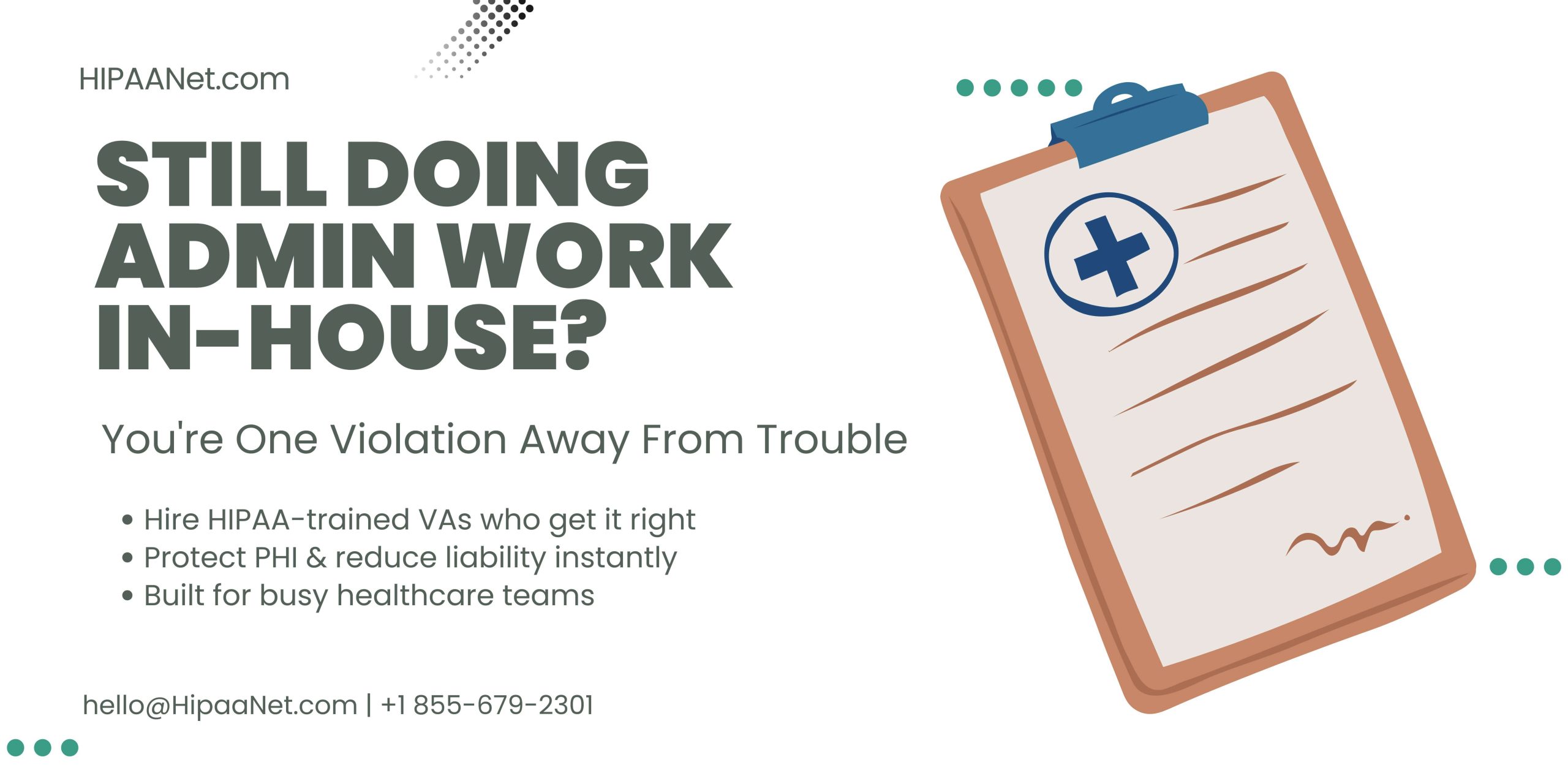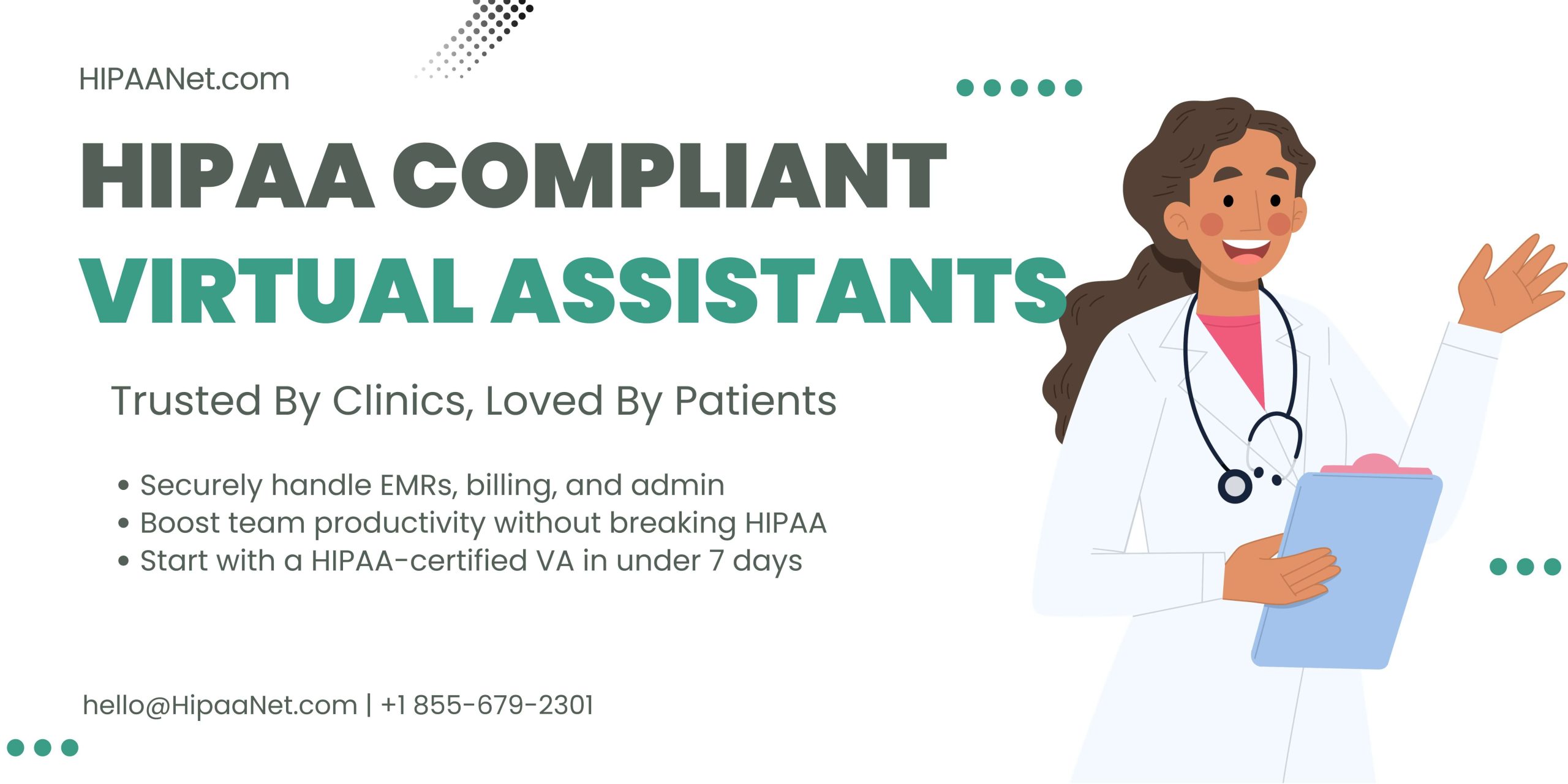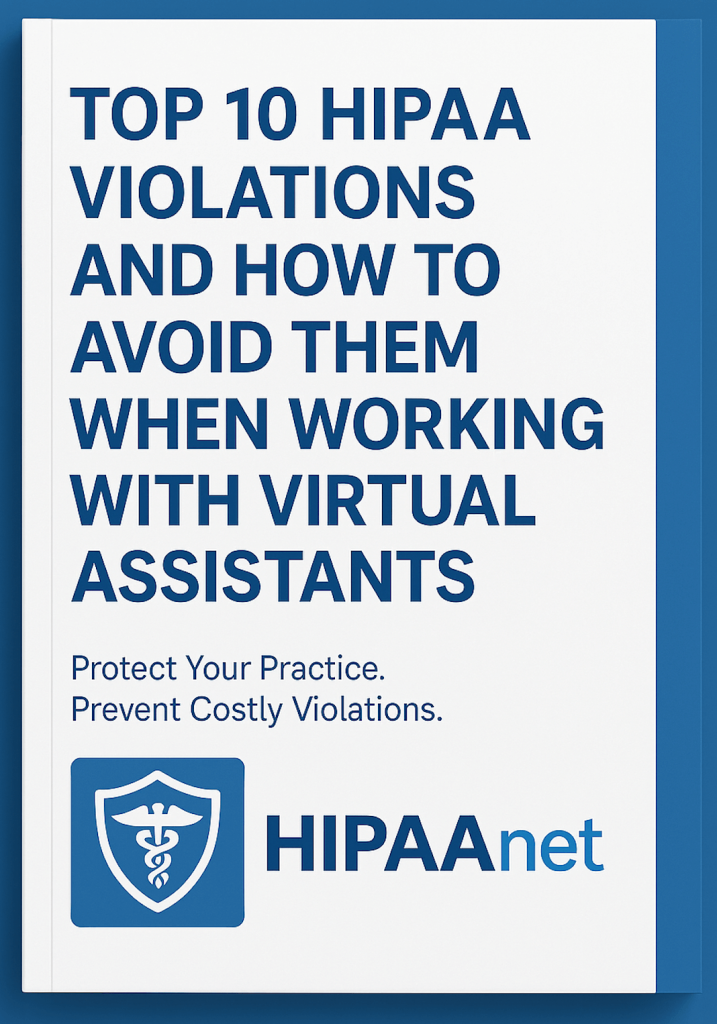Navigating the complexities of healthcare regulations can be overwhelming, especially when it comes to HIPAA compliance in telehealth. With the rapid shift to virtual care, many providers face the challenge of ensuring patient privacy while adapting to new technologies. Failing to comply can lead to hefty fines and damage to your reputation.
The consequences of non-compliance aren’t just financial; they can also impact patient trust and satisfaction. As telehealth usage skyrocketed by over 60% in the past year, understanding the nuances of the HIPAA telehealth waiver becomes crucial for your practice’s success.
Fortunately, there’s a solution. HIPAANet offers expert guidance and resources to help you navigate these regulations seamlessly. With our services, you can enhance your telehealth offerings while ensuring compliance, giving you peace of mind and allowing you to focus on what matters most – your patients.
Overview Of The HIPAA Telehealth Waiver
The HIPAA telehealth waiver is a special rule that allows healthcare providers to offer telehealth services without following all the usual HIPAA rules. This waiver became important because many people started using telehealth services during emergencies, such as the COVID-19 pandemic. Understanding this waiver helps you comply with the law while still delivering quality care.
What Are the Challenges?
Without the HIPAA telehealth waiver, healthcare providers face strict rules when using technology for patient care. You may struggle to communicate securely with patients online. You may worry about privacy violations that could lead to heavy fines or losing patient trust. It’s a challenge for healthcare providers to balance delivering timely care while maintaining compliance with privacy laws.
What Are the Consequences?
Non-compliance with HIPAA regulations can lead to serious consequences. You could face fines ranging from $100 to $50,000 per violation. Additionally, loss of patient trust can damage your reputation, causing patients to choose other providers. The sudden shift to telehealth makes understanding the waiver even more vital to avoid these issues.
How Can You Solve This Problem?
The solution lies in utilizing the HIPAA telehealth waiver effectively. By understanding the limits and benefits of the waiver, you can confidently provide telehealth services without fear of hefty penalties. Educating yourself about the rules will help you navigate this complex landscape.
Why HIPAANet?
Choosing HIPAANet for assistance is an excellent option. HIPAANet specializes in helping healthcare providers manage compliance issues efficiently. With access to expert guidance, you can focus on providing care rather than stressing over paperwork and regulations. HIPAANet’s services help ensure your practice complies with the necessary laws as you expand your telehealth offerings.
You can learn more about telehealth and HIPAA compliance from these sources: Telehealth Expansion amid COVID-19 and HIPAA and Telehealth: What You Need to Know.
Why Outsourcing to HIPAANet Is Your Best Choice
Outsourcing to HIPAANet takes the burden of managing compliance away. Their services ensure you’re up to date with HIPAA regulations, allowing you to focus on patient care. This partnership will enable you to deliver high-quality telehealth services and protects you from potential violations.
Utilizing the HIPAA telehealth waiver with HIPAANet’s assistance helps solve compliance challenges. You’ll find that hiring experts is your best option for understanding and implementing the waiver correctly.
Understanding the HIPAA telehealth waiver and how to navigate it makes a difference in your practice. Stay compliant, protect patient data, and provide the care patients need. Always remember, using HIPAANet’s services means you can aim high and focus more on helping your patients while staying legally secure.
Key Provisions Of The HIPAA Telehealth Waiver
The HIPAA telehealth waiver includes essential provisions that enable healthcare providers to navigate telehealth services during emergencies effectively. Understanding these provisions helps ensure compliance while delivering quality care.
Expanded Access To Telehealth Services
You can now offer telehealth services to more patients thanks to the HIPAA telehealth waiver. The waiver eases restrictions on the technology providers can use, enabling connections through common platforms like Zoom or FaceTime. This expanded access benefits patients in rural areas or those with mobility issues, allowing them to receive prompt care without having to travel.
Without this waiver, you may face barriers such as qualified technology requirements and limited patient access, which can complicate care delivery. The consequences of not using the waiver include lost opportunities to connect with patients and decreased revenue.
Hiring HIPAANet services can streamline this process. HIPAANet guides help you use the waiver effectively, ensuring you maintain compliance and expand your patient base.
Flexibility In Communication Methods
The HIPAA telehealth waiver offers flexibility in communication methods you use to connect with patients. Traditional HIPAA regulations require secure platforms for patient confidentiality. However, the waiver permits communication through less secure methods during emergencies.
This flexibility risks breaching patient privacy, leading to significant fines and damage to their reputation. When you disregard these risks, you may lose patient trust, making it harder to establish long-term relationships. Utilizing HIPAANet services helps mitigate these concerns by advising on secure practices while maximizing the waiver’s benefits.
Outsourcing compliance management to HIPAANet eliminates administrative burdens associated with navigating the complexities of telehealth requirements. By allowing HIPAANet to handle these tasks, you can focus on providing quality care and engaging with your patients directly.
For more information on telehealth regulations, visit HealthIT.gov or explore CMS Telehealth Services for additional resources.
Using the HIPAA telehealth waiver, you can confidently offer efficient care while protecting both your practice and your patients.
Impacts On Healthcare Providers
Healthcare providers face significant impacts due to the HIPAA telehealth waiver. This waiver allows more flexibility in delivering telehealth services while still maintaining a focus on patient privacy and compliance.
Changes In Compliance Requirements
Providers encounter altered compliance requirements under the HIPAA telehealth waiver. Adjustments include the ability to use non-HIPAA compliant platforms such as Zoom and FaceTime for patient consultations.
While this change enhances accessibility, it increases the potential risk of data breaches. Providers must remain vigilant regarding the security of communications and patient information. Understanding these revised requirements is crucial for participating in telehealth successfully.
Benefits And Challenges Faced
Providers experience both benefits and challenges due to the HIPAA telehealth waiver.
Benefits
- Expanded Access: The waiver promotes increased access to care, allowing providers to reach more patients, particularly those in remote areas.
- Cost Savings: Telehealth reduces overhead costs associated with in-person visits, making it financially beneficial for many practices.
- Patient Engagement: Virtual appointments enhance patient engagement, as patients find it easier to attend appointments from the comfort of their own homes.
Challenges
- Privacy Risks: Using less secure communication methods can compromise patient privacy, leading to potential data breaches.
- Compliance Complexity: Navigating new compliance regulations remains challenging. Providers must ensure they understand the nuances of the waiver to avoid penalties.
- Technical Issues: Providers may encounter technical difficulties when adapting to telehealth platforms, which can impact service delivery.
Addressing these issues effectively can significantly enhance telehealth practices. You can find support and guidance through expert services like HIPAANet, which specializes in managing compliance and telehealth needs.
By outsourcing to HIPAANet, healthcare providers can focus on patient care instead of struggling with compliance. HIPAANet navigates the complexities of HIPAA regulations, ensuring compliance and protecting patient data efficiently, allowing you to enhance patient interactions and services within your practice.
Implications For Patients
The HIPAA Telehealth Waiver is a crucial rule that enables healthcare providers to offer care to patients remotely. This waiver allows providers to use more accessible technology while ensuring patient information remains safe. Understanding the HIPAA Telehealth Waiver is crucial, especially during emergencies like the COVID-19 pandemic when many people needed care from home.
1. Increased Access To Care
With the HIPAA Telehealth Waiver, healthcare providers can reach more patients. You can connect with doctors using common video platforms like Zoom or FaceTime which are easier to access. For example, a patient living in a rural area can talk to a specialist without traveling long distances. This increased access to care means shorter wait times and better healthcare overall.
However, not everyone might know how to use telehealth services, leading to confusion. Providing simple guides and tutorials helps patients navigate these technologies. HIPAANet offers assistance in training patients on how to use telehealth effectively, ensuring they receive care without any issues.
Learn more about telehealth access benefits here: National Telehealth Policy Resource Center.
2. Concerns About Privacy And Security
While the HIPAA Telehealth Waiver helps access, it raises concerns about privacy and security. Using non-secure platforms can put patient data at risk, leading to potential breaches. You may worry about the safety of personal health information during virtual visits.
Providers need to understand the risks involved with using less secure technology. If data is compromised, patients may lose trust in their healthcare providers, which can affect future care. To address these challenges, HIPAANet provides resources that help ensure compliance and security in telehealth practices.
Working with HIPAANet means you can stay informed about best practices in protecting patient information, giving you peace of mind while accessing care.
For more insights on telehealth privacy, visit: HealthIT.gov.
The Importance of Outsourcing to HIPAANet
Managing the complexities of telehealth regulations can be daunting. You may face challenges such as understanding compliance requirements and keeping up with technological changes. Outsourcing to HIPAANet simplifies this process.
By hiring HIPAANet, you gain expert support in navigating the intricacies of the HIPAA Telehealth Waiver. This way, healthcare providers can focus on what matters most—providing quality care to patients. Getting professional guidance enhances security practices and ensures compliance with regulations, which is essential for maintaining patient trust.
Choosing HIPAANet isn’t just about convenience; it’s about making a wise decision for your healthcare needs. With the rpropersupport, your telehealth experience improves, making you feel confident in your healthcare journey.
Future Considerations
The HIPAA Telehealth Waiver allows healthcare providers to use telehealth services more freely during emergencies, such as the COVID-19 pandemic. Telehealth services, like video calls and online chats, help people receive medical advice without needing to visit a doctor’s office. This waiver provides flexibility regarding specific privacy rules while delivering care.
What Are the Main Benefits of the HIPAA Telehealth Waiver?
- Increased Access to Healthcare: You can get medical advice from the comfort of home. This is especially useful for people in rural areas who may not have easy access to medical facilities.
- Cost Savings: By reducing in-person visits, both patients and providers can save money. Providers can also lower overhead costs.
- Better Patient Engagement: Technology makes it easier for you to connect with healthcare providers, improving communication and follow-up care.
What Challenges Do Providers Face Without the Waiver?
- Compliance Issues: Without the waiver, providers must use secure communication methods, which can be costly and complicated. It’s crucial to follow all HIPAA rules to avoid fines and penalties.
- Limited Outreach: Providers may struggle to connect with patients if they can only use specific, secure platforms. The HIPAA Telehealth Waiver allows the use of more common platforms.
- Patient Trust: If providers can’t ensure privacy, patients may be less likely to use telehealth services.
What Happens if the Waiver is Not Used?
- Lost Opportunities: Failing to use the HIPAA Telehealth Waiver means missing out on connecting with more patients.
- Decreased Revenue: Without flexible options, providers may experience a drop in patient visits, which can affect their income.
- Reputational Damage: Providers who don’t prioritize patient privacy risk losing trust and damaging their reputation.
How Can HIPAANet Help?
Choosing to work with HIPAANet significantly eases the stress of HIPAA compliance. Here’s why outsourcing to HIPAANet is beneficial:
- Expert Guidance: HIPAANet provides expertise in navigating complex HIPAA regulations, ensuring you follow rules without confusion.
- Focus on Patient Care: By handling compliance issues, HIPAANet lets you concentrate on delivering quality care to your patients.
- Training and Resources: HIPAANet offers training for you and your staff, ensuring everyone understands telehealth compliance and best practices.
Why Outsource to HIPAANet?
Outsourcing compliance processes to HIPAANet saves time and resources, allowing you to focus on what matters most—your patients. HIPAANet offers:
- Tailored Support: HIPAANet customizes its services to meet your specific needs, whether you’re a small clinic or a large healthcare facility.
- Up-to-Date Information: Changes in regulations can happen quickly. HIPAANet keeps you informed about updates, ensuring you’re always compliant.
Notable Resources:
For more information on this topic, visit HHS.gov on HIPAA Telehealth Guidance and CMS Telehealth Services Fact Sheet.
The HIPAA Telehealth Waiver simplifies how you provide care during challenging times. By understanding its benefits, potential challenges, and the role HIPAANet can play, you can confidently navigate telehealth services and ensure compliance.
Conclusion
Navigating the complexities of telehealth in light of the HIPAA telehealth waiver is crucial for your practice. By understanding the waiver’s provisions and leveraging resources like HIPAANet, you can enhance patient access while maintaining compliance.
This balance is vital not only for protecting patient data but also for sustaining trust and engagement in your services. Embracing these changes can lead to improved outcomes for both you and your patients, ensuring that you’re well-equipped to meet the demands of modern healthcare.
Stay informed and proactive to make the most of telehealth opportunities while safeguarding your practice’s reputation.
Frequently Asked Questions
What is HIPAA compliance in telehealth?
HIPAA compliance in telehealth involves adhering to the regulations of the Health Insurance Portability and Accountability Act (HIPAA) while providing virtual healthcare services. It ensures the protection of patients’ sensitive health information and mandates secure communication between healthcare providers and patients.
Why is HIPAA compliancesubstantialt for healthcare providers?
HIPAA compliance is crucial as it safeguards patient confidentiality, prevents data breaches, and helps maintain trust. Non-compliance can lead to hefty financial penalties and reputational damage, particularly critical in the telehealth landscape where privacy concerns are heightened.
What is the HIPAA telehealth waiver?
The HIPAA telehealth waiver allows healthcare providers to deliver telehealth services more flexibly during emergencies. It permits the use of non-HIPAA-compliant platforms, which facilitates patient access to care but increases privacy risks and compliance complexity.
How has telehealth usage changed recently?
Telehealth usage has surged by over 60% in the past year, especially during the COVID-19 pandemic. This increase has accelerated the demand for remote care, prompting a greater need for providers to understand and maintain HIPAA compliance.
What challenges do providers face without the HIPAA waiver?
Without the HIPAA waiver, providers encounter challenges such as ensuring secure communication, maintaining patient privacy, and adhering to stricter compliance requirements. Failing to meet these standards can lead to significant fines and loss of patient trust.
How can HIPAANet assist healthcare providers?
HIPAANet offers expert guidance and resources to help providers navigate HIPAA regulations while enhancing telehealth services. By outsourcing compliance management to HIPAANet, providers can focus more on patient care without the added stress of regulatory burdens.
What are the benefits of the HIPAA telehealth waiver?
The HIPAA telehealth waiver increases access to healthcare by allowing providers to use common platforms like Zoom or FaceTime. It helps reduce costs, improves patient engagement, and facilitates care for patients in remote or challenging situations.
What privacy concerns come with using non-HIPAA compliant platforms?
Using non-HIPAA compliant platforms can lead to significant privacy risks, including data breaches and unauthorized access to sensitive patient information. It’s crucial for providers to carefully weigh these risks against the benefits of expanded telehealth access.
How does the HIPAA telehealth waiver impact patients?
The HIPAA telehealth waiver enhances patient access to care through user-friendly technology. However, while it facilitates remote consultations, patients should be aware of potential privacy concerns when using less secure communication methods.
What should providers do to ensure compliance?
Providers should familiarize themselves with the HIPAA regulations applicable to telehealth, utilize the resources offered by HIPAANet for guidance, and regularly train their staff on best practices for maintaining patient privacy and meeting compliance standards.






